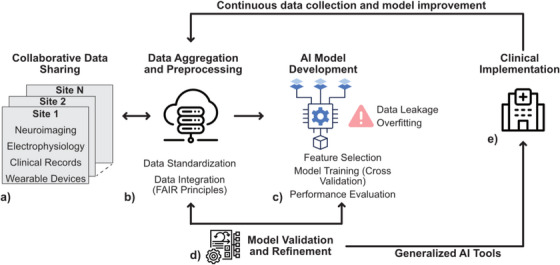FIGURE 1.

Artificial intelligence (AI)‐powered epilepsy management. (a) Collaborative sharing of epilepsy data is critical to developing AI models that can be generalized for clinical implementation. Epilepsy data broadly includes multimodal neuroimaging, electrophysiology, medical information from electronic health records, and wearable device data. (b) Neuroinformatics infrastructures provide the technological foundation essential to securely aggregate, manage, and analyze large‐scale epilepsy datasets. When selecting an infrastructure, researchers should prioritize those that adhere to findability, accessibility, interoperability, and reusability (FAIR) principles. (c) AI model development includes feature selection, model training, cross‐validation, and performance evaluation while taking precautions against data leakage and overfitting. (d) Model validation and refinement is an iterative process that improves AI models through shared data and feedback. (e) Clinical implementation translates AI research into clinical practice, with a feedback loop to ensure continuous data collection and model improvement.
